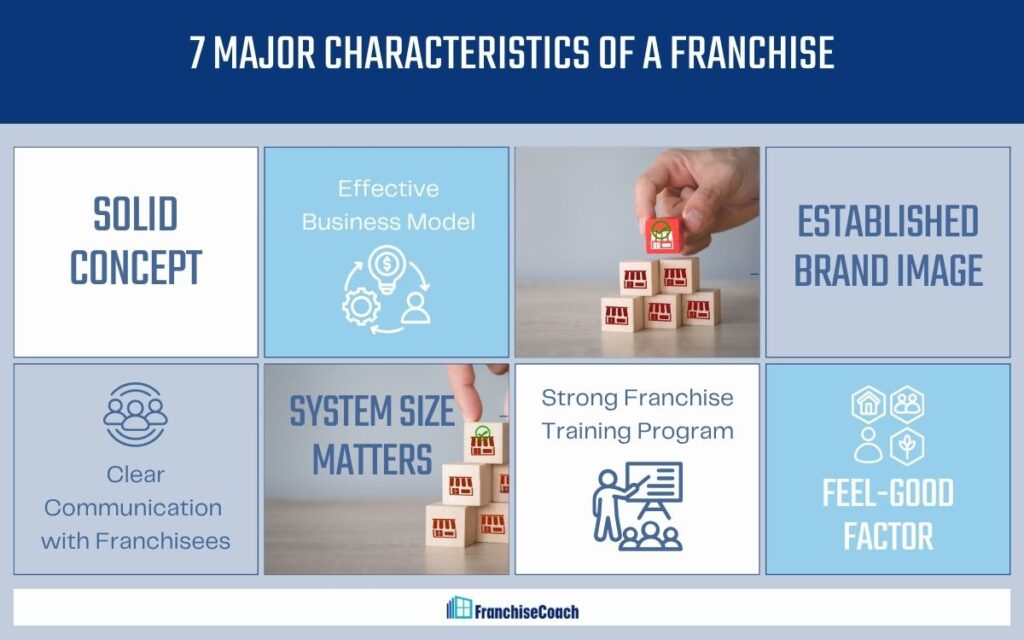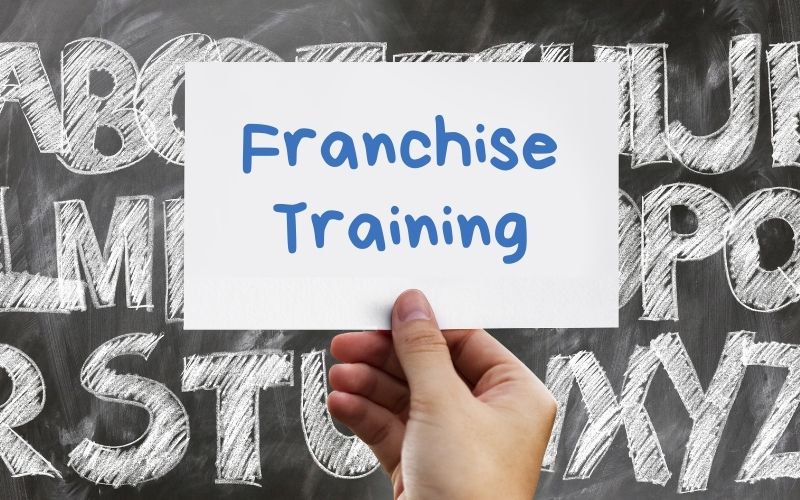William Penn said that “Patience and diligence remove mountains.” If you’re seriously considering franchising, you’re looking for the perfect franchisor to partner with. But that would not be enough because it is vital to check the characteristics of a franchise business that you are looking for.
Sifting through the ocean of information about your options can be a daunting process that requires patience and due diligence.
The same goes for finding the right one out of 4,000 concepts can be challenging.
But the good thing is that thoroughly researching the characteristics of a franchise could lead you to find the best opportunity and even lead you to choose a highly profitable one.
7 Major Characteristics of a Franchise

After you sign a franchise agreement, renouncing is no longer an option. You will not regret it in the future if you will do a careful investigation in the first place.
Your investment cannot be wasted in any sort so searching for the perfect one before signing in is very important.
1. Solid Concept

When choosing a franchise, the first question is-
“What do they do?.”
The answer to that question is the concept. This can be anything from the following examples:
- Water Restoration
- Business Coaching
- Painting
- Gym
The possibilities are endless. Once you know what the organization does, the next question is:
“Who does it serve?”
Your answers above might change to the following:
- Residential Water Restoration
- Executive Business Coaching
- Commercial Painting
- Personalized Training
Beyond the market designation, a franchise might have a unique hook or angle that makes it one of a kind. The following are examples of the concepts:
- The water restoration company might offer 2 hour response time at any time of the day or night.
- The business coach might specialize in helping companies in “transition.”
- The painting franchise might leverage patented technology in its process.
- The gym might specialize in training clients over 45 years old.
In each case, there are defining characteristics of a franchise that help make a business unique.
As a consumer, we’re already aware of concepts.
But as potential investors, we’re looking deeper at what makes a concept unique. We want to know how it’s implemented, and how it provides a satisfying experience to the customer.
What would make our franchise gym better than the other gym that’s half a mile away and that has been in business for decades? What does that gym offer its customers to maintain their loyalty?
As a potential investor, you should know what makes the franchise a successful business. As you explore franchise opportunities, you may choose to…
1. Eliminate a whole number of candidates based on industry and concept.
For example,
Some people are not interested in working in the food industry. This takes several hundred franchise possibilities out of the running.
Some don’t want to be responsible for a retail outlet and the investment that entails. This would eliminate many more franchise concepts.
2. It’s good to set clear parameters regarding what kind of businesses you don’t want to consider.
Just be careful not to dismiss too many possibilities out of hand. In my experience, many franchisee candidates choose the option that was originally their last choice.
The key at this beginning stage is to be able to identify a concept that benefits all the parties involved.
In an ideal situation, the franchisor has a winning idea that grows and makes a profit.
The franchise owner finds a way to leverage his or her business acumen to help further build the business and earn profits, and the customer receives good quality services or products.
If your concept is to win, then it’s time to move on to the next characteristic- the franchise’s business model.
2. Effective Franchise Business Model
Before assessing any franchise investment, ask yourself:
“How does the franchisor provide its product in a way that it can replicate success in each new unit?”
Or, “What is the franchise business model?”
When we refer to these systems, it is about how the franchising organization achieves its goals through daily business activities.
A franchise business owner should know how to:
- hire
- train
- purchase
- market
- deliver products
- make bills
- use technology
These skills are essential. Gain more knowledge of individual franchise brands.
You should be impressed at the efficiency and comprehensiveness of their systems.
Successful franchise businesses have a rich system with simple processes. You should see consistency from one unit to the next in terms of marketing, responsiveness, product offerings, and professionalism.
At first glance, you won’t know the details of a franchisor’s systems.
But you should understand its efficiency and capability while investigating the company.
Can you appreciate how the franchisor, franchisees, and customers are all succeeding? Do you feel you could trust this organization if you were a potential customer or franchisee?
The success of franchising is rooted in the systems. The franchisor has in place to ensure quality and consistency from the franchisees.
3. A Good Franchise Training Program

The franchisor’s most important role is as a trainer. Each franchisor has a different approach to training.
And, in some cases, the more you invest the more help you will receive. Many franchises have great training programs that deliver classroom and onsite instruction.
In line with this, Albert Einstein once said that “If I had only one hour to save the world, I would spend fifty-five minutes defining the problem, and only five minutes finding the solution.”
Franchisors have spent vast resources understanding their business. And they transfer this knowledge to you as a franchisee.
Proper training is critical characteristics to a successful business.
4. Established Brand Image
Brand equity is one of the greatest benefits of buying into an established franchise.
In established franchises, customers already recognize and trust the brand and they are willing to pay a premium price for services.
When one works out at Orange Theory Fitness, it doesn’t matter where the outlet is located, they trust that it will be a great experience.
As a proven track record system franchisee, you don’t have to start from zero to prove that your brand sells quality products or services.
As a potential investor, are you sold on the brand?
So as a potential franchisee, the franchisor expects you to protect the brand.
McDonald’s won’t allow you to sell gyros on the menu. Some potential investors are discouraged by how little freedom they have to tweak the franchise system.
5. Franchises with Larger System Size
The benefits and risks of a small system
To be a part of a small franchise system, you get support from the corporate office but you may not have access to certain resources.
One of the major benefits of investing in a small franchise system is the potential for higher returns. Smaller franchises often require less capital and offer more flexibility, which could result in more profit.
For example, a small franchise might be able to specialize in a certain product or service that larger franchises may not have the capacity to provide.
Additionally, wing to the lower overhead costs, your investment in a small franchise may generate higher returns than it might if you invested in a larger system.
The risks of small franchises can include less capital and fewer resources.
It also means that there’s less support from the franchisor, which could lead to more risk for franchisees.
The benefits and risks of a large system
Larger franchises have more established operations, with enhanced audit systems, updated technology, and economies of scale in purchasing goods or services.
Some entrepreneurs may feel less autonomy over their businesses.
And with a larger franchise system also means more competition.
However, the risk is lower than small systems or newer franchise opportunities because their system had already been tested long ago.
6. Clear Communication With Franchisees

Communication is vital between the franchisor and the franchisee. Check out the advantages in gaining good communication:
- The better the internal communication in a system, the better the opportunity. It builds a lasting relationship with the business.
- Most franchise agreements last for 10 years or more. You have the urge to renew the franchise agreement if good communication is between you and the franchisor.
- Sometimes franchise relationships get complicated, and it is normal. Fixing the issue will retain the good company and avoid further conflicts.
Remember, it is important that you feel at ease with the franchisor to build a lasting relationship.
To do that, cultivate effective and clear communication at the beginning of your franchise career.
Lastly, look for systems that have a goal-oriented culture. The opportunity should also contain knowledgeable, approachable corporate staff and happy franchisees.
7. A Feel-Good Franchise
In the world of franchising, a “feel-good franchise” embodies a unique and commendable characteristic that goes beyond just profitability. It is a franchise with a heart, one that recognizes the importance of giving back to people in many facets of its operations.
This franchise trait is defined by its commitment to making a positive impact on society, its customers, and its employees.
Here are some key aspects that define a feel-good franchise:
Social Responsibility
Feel-good franchises are socially responsible entities. They understand that their success is intertwined with the well-being of the communities they serve. They actively engage in activities that benefit society and the environment.
From “green” operating procedures that minimize their ecological footprint to supporting local community projects, these franchise opportunities are dedicated to making the world a better place.
Philanthropy
Giving back is at the core of their mission. Feel-good franchises don’t just focus on their bottom line; they also focus on uplifting those in need. They consistently raise money for charities, contributing to causes that matter.
By aligning their success with charitable endeavors, they create a positive ripple effect in their communities.
Employee Development
Feel-good franchises prioritize the personal development and growth of their employees. They recognize that a motivated and well-trained workforce is essential for both their success and the happiness of their team members.
These franchises invest in employee training, provide opportunities for advancement, and foster a supportive work environment.
Community Engagement
They actively engage with the local community, not just as a business but as a member of the neighborhood.
Whether it’s sponsoring local events, participating in volunteer activities, or collaborating with other businesses to drive community initiatives, feel-good franchises are deeply ingrained in the fabric of their surroundings.
Corporate Citizenship
Being a good corporate citizen is not just a slogan for these franchises; it’s a way of life. They uphold high ethical standards and are committed to doing what’s right, not just what’s profitable.
This commitment to ethical business practices builds trust with customers and enhances their reputation.
Standout in the Franchise Landscape
During your franchise investigation, you will likely notice that feel-good franchises stand out from the crowd. Their dedication to making a positive impact and their genuine care for their customers and employees differentiate them in the competitive franchise landscape.
They are more than just businesses; they are beacons of hope and positivity.
Summary
All seven characteristics of a franchise business are worth considering in the investigation process. It will help you determine the right franchise you would like to invest in.
If you are ready to start your franchise journey, a well-qualified franchise consultant can help guide you through the entire franchising process.


